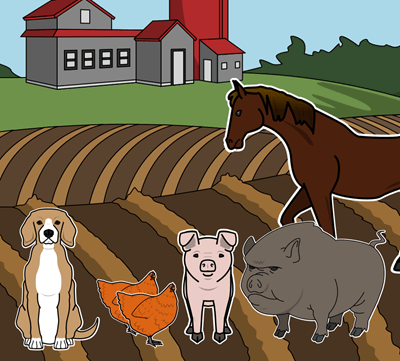Student Activities for Animal Farm
Essential Questions for Animal Farm
- What responsibilities do individuals have in society?
- What makes a good leader?
- How can we avoid making the same mistakes that history has made?
Animal Farm Summary
On the Manor Farm, a venerable boar named Old Major gathers the animals for a meeting and inspires them to revolt. Although he dies, two pigs, Napoleon and Snowball, vow to continue his work, and lead the others in driving off the unfit, drunken farmer. The pigs of the farm begin to establish a new government where animals have rights. They adopt "The Seven Commandments of Animalism", the most important of which is: "All animals are equal."
The animals begin to read and write. They use the commandments to educate all the young. Food is plentiful, and the farm runs smoothly. However, when the pigs elevate themselves to positions of leadership, a struggle for power begins between the two successors to Old Major. Napoleon wins by having his dogs chase Snowball off the farm.
As supreme leader, Napoleon enacts changes to the governance of the farm, replacing meetings of all animals with a committee of pigs who will run the farm. Eventually, Napoleon's supremacy has him paranoid that someone will try to overthrow him. Using Snowball, the pig he chased away, as a scapegoat for incidents happening on the farm, Napoleon begins to purge the farm. He accuses other animals of conspiring with his old rival, and attacks them with dogs. The animals become convinced that they were better off with the farmer, Mr. Jones, than the tyranny that has come to be.
Things get progressively worse on the farm. Animals are worked to the point of collapsing, and it is clear that the commandments have been rewritten. Most ominously, the first commandment now reads: "All animals are equal, but some are more equal than others." The pigs begin to take on human qualities like walking upright and dealing with other farmers. As the animals gaze at pigs and humans, they realize they can no longer tell the two apart.
How To Facilitate a Discussion on Animal Farm in Class
Discuss Objectives of Discussion
Animal Farm is a story that contains many elements of hidden symbolism and has a lot to uncover. Teachers should clearly define the objectives of each discussion on different topics of animal farm. Students should be clear about what is expected of them and how they can add value to the discussion.
Select a Specific Topic
Teachers can divide the topics for discussion such as themes, vocabulary, literary elements, etc. into different classes and dedicate one topic to each lecture. This will help students maintain their focus in one place and understand each topic effectively.
Analyze the Setting and Characters
Ask the students to begin by discussing the setting and characters of the story. Guide the discussion by asking open-ended questions such as Who are the main characters? What are their motivations? Why has the setting of the animal farm been used? etc.
Discuss the Intended Lesson
Guide a discussion on what the students think is the moral of the story or what the author wanted the readers to understand. This will help students find the meaning of the hidden symbolism and comparisons used in the story by the author.
Research Author’s Background
Ask the students to research some information on the background of the author. This will help them analyze why certain themes are part of the story and what influenced the author to write this story.
Frequently Asked Questions About Animal Farm by George Orwell
Who are the key characters in the story?
Old Major, the boar who starts the revolution, Napoleon, a pig who seizes power, Snowball, another pig who takes the initiative, Boxer, a devoted horse, and Squealer, a persuading pig, are the primary characters in the story. These characters start a revolution against the farmer but in the end, they themselves become part of the problem.
What is implied by "Animal Farm"'s finale regarding the repetition of history?
The conclusion, in which the pigs resemble the humans they previously revolted against, implies that history is prone to repetition. It serves as a warning about how revolutions could end up being manipulated by the exact interests they set out to defeat.
What is the implication of, "All animals are equal, but some animals are more equal than others" in the story?
This line, which is used at the end of the novel, mocks the hypocrisy of the aristocracy. It implies that although equality for everyone was the initial goal, the pigs have corrupted the system to maintain their own privilege and power. This line brings out the irony element and reflects on many such instances in our society.
- Czar Nicholas II • Museum of Photographic Arts Collections • License No known copyright restrictions (http://flickr.com/commons/usage/)
- Karl-Marx-Stadt auf Trab - Friedenslauf am Karl-Marx-Monument • Uwe Kaufmann1 • License Attribution (http://creativecommons.org/licenses/by/2.0/)
- Kazan temple and Historical muzeum • akk_rus • License Attribution (http://creativecommons.org/licenses/by/2.0/)
- Marx at Highgate • [Duncan] • License Attribution (http://creativecommons.org/licenses/by/2.0/)
- STALIN-angry-JPG • snowlepard • License Attribution (http://creativecommons.org/licenses/by/2.0/)
- Trotsky cor 06 • Luiz Fernando / Sonia Maria • License Attribution (http://creativecommons.org/licenses/by/2.0/)
Introductory School Offer
ONLY$500
- 1 School
- 5 Teachers for One Year
- 1 Hour of Virtual PD
30 Day Money Back Guarantee • New Customers Only • Full Price After Introductory Offer • Access is for 1 Calendar Year
© 2025 - Clever Prototypes, LLC - All rights reserved.
StoryboardThat is a trademark of Clever Prototypes, LLC, and Registered in U.S. Patent and Trademark Office








